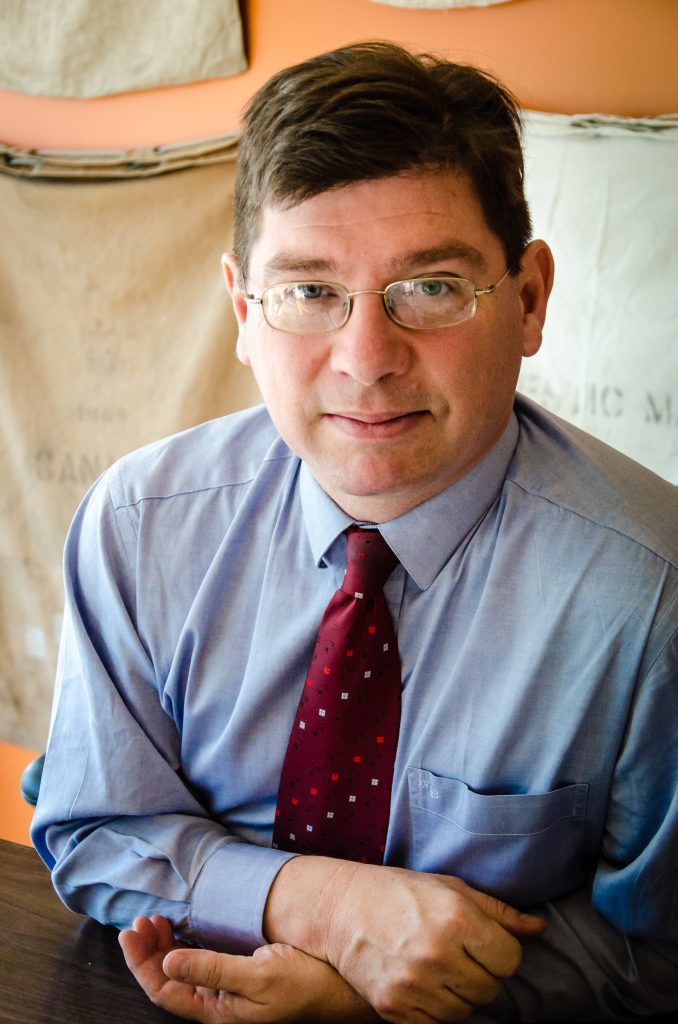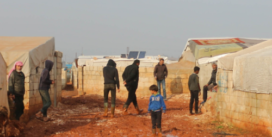- Fall Newsletter, 2025, Issue 15
- Using International Online Learning Modules to Engage Students in the Study of Critical Global Issues
- Upcoming Book Launch: Hearts of Freedom
- Announcing winners of the 2025 CARFMS Essay Contest
- The New York Declaration for Refugees and Migrants and its two Global Compacts: Addressing the Symptoms or the “Root Causes” of Forced Displacement?*
“Mobility is a part of who we are” Notes from the Field: François Crépeau Interviewed by Teodora Pasca
François Crépeau Interviewed by Teodora Pasca
François Crépeau is a professor of international law and the Director of the Centre for Human Rights and Legal Pluralism at McGill University. From 2011 to 2017, he served as the United Nations Special Rapporteur on the Human Rights of Migrants. Professor Crépeau was interviewed by Teodora Pasca, who recently obtained her Bachelor of Arts from the University of Toronto and who is starting her law degree in the fall.
Professor Crépeau has decades of experience working with people in the most precarious situations — yet his optimism in the future of migrants’ rights is unwavering. As he puts it, “mobility is a part of who we are.” We talked about the resilience of migrants, the role of law in creating social change, and the important role young people have to play in shaping an increasingly diverse world.
TP: What were the most significant take-aways from your work as the Special Rapporteur?
FC: Migrants are courageous, full of grit and determination. They follow objectives that are linked to feeding their family, helping their siblings, creating a future for themselves and their children. Migrants make not only courageous decisions, they make the right decisions for themselves. Whether it is legal or not doesn’t matter. They are guided by a sense of duty, by love, by sheer determination to create something for themselves and their loved ones. And if you take different periods in history, you have people who try their luck. The current moment is not very different from Jewish families leaving Nazi Germany illegally, crossing the Atlantic or finding refuge in other parts of Europe. This is not different from the kinds of decisions that Spanish Republicans took during the Spanish Civil War.
TP: It sounds then like there is a pretty significant tension between morality and law.
FC: There is. The law is made by the rulers. Minorities have always been dependent on the benevolence of the majority, and therefore have to either provide for themselves or to count on the majority’s goodwill. In the twentieth century, we have created tools for protecting the individual against the actions of the majority. But the law, by itself, has never changed anyone’s life. Law is a key tool in order to make political struggle last, but the political struggle is necessary in order for the law to be applied. You need political mobilization, and also, institutions that are able to carry what the law may decide.
TP: Given the current political climate in the US and Europe, do you think there are more barriers to pursuing social change for migrants than there were previously?
FC: The pessimistic view is that we see increasing resistance to mobility and migration. We have erected barriers like no time in history to prevent people from moving, especially specific people. There’s no difficulty for Canadians to enter Europe. Most of us, with our Canadian passport, can enter Europe pretty freely. That’s not true for the vast majority of the population of the world. We’ve seen, for example, the new Italian Minister of Home Affairs who recently prevented a humanitarian rescue boat with 629 migrants on board from entering Italian ports, saying that Italy is closed to migrants. These people are on the boat, not knowing what to do, and probably without food and sanitary installations; many of them are unaccompanied minors or pregnant women.
But there is also an optimistic thread. Mobility is part of who we are. We’re moving all the time, for work, for studies, or for simple wanderlust — we want to see what the rest of the world is like. 400 years of territorial sovereignty theory is not going to change that. I have the impression that because of technological change, because of knowledge of what’s happening in the rest of the world, people imagine themselves elsewhere. The youth will have very different ideas about diversity than my generation. 75 per cent of the youth voted against Brexit in the UK, and somehow, they have been robbed by my generation of their European future. With the populist governments that are popping up, maybe the youth will change its position. But I have the impression that the current populist moment is the swansong of my generation, who has not understood that mobility and diversity is in the future of our societies.
The mayors of Palermo, Naples, and other Italian port cities have now announced that they will defy the government’s order and keep their ports open. Maybe there will be resistance created by this populist wave, and the next generation will hail diversity and mobility as essential features for the future of our societies.
TP: If you could change one thing about how refugees are treated in Canada, what would it be?
FC: Less detention, that’s for sure. Not having documents as a migrant is a simple administrative violation, not a crime — but even countries that treat it through administrative law have emulated criminal law mechanisms. We see, for example, migrant detention centres being built on the exact same model as maximum security prisons. Crossing the border without the proper papers is not a crime against persons or property, and it’s not a crime against the security of the state: 99.9 per cent of migrants are totally innocuous. Canada tends to detain much less than other countries, but all countries, including Canada, need to build more non-custodial mechanisms for sheltering undocumented migrants.
We should forget the fantasy of the criminal migrant — it’s just that, a fantasy. The proportion of criminals in settled societies is higher than the proportion of criminals in migrant communities, if you exclude migration offences, of course, and drug offences. When you find yourself at the margins of society with no right to work, social capital, or connections, there is very little way to survive apart from quick money. But migrants are not criminals: they are extremely resilient people who are driven by the will to succeed.
TP: What advice would you give to students at the end of undergraduate studies?
FC: Studying has to be meaningful. One should not study for social status or money; one should study for changing the world. You may remember Bronisław Geremek, the second-in-command of Solidarność, the resistance to the Polish communist regime. Geremek did fifteen years in prison and led clandestine university classes during the regime. Years ago, he came to l’Université du Québec à Montréal and gave a speech to our graduating students. He told them that the degree you are going to receive is first and foremost a degree in courage — courage to stand for your opinion, to fight for yourself and others, and to use the knowledge you have gained to make society better. The speech was so well-received that the ceremony was completely disrupted. Normally, students enter on the left side of the stage, cross the stage to see the principal or the dean, and exit by the right-hand side. Here, the fourth student came up the stairs, crossed the stage, and then crossed back to go and shake Geremek’s hand. And she went across the stage again, and the next student went to him as well. All students did that after her. It was a huge mess — and it was extraordinary. It was a sign that you have to disrupt well-oiled ceremonies to do the right thing: to shake hands with someone who inspired you.
To those going to law school, I would also say one has to have faith in international law. For most people, international law, and especially international human rights law, is fluffy, aspirational language that doesn’t bind and therefore doesn’t count. It’s not true. International law is a response to the fundamental fear we all have of lawlessness, and especially in a world that is well populated and complex, we need law to order the world.
Notes from the Field
CARFMS Notes from the Field is based on a conversation between an undergraduate student finishing their degree or a postgraduate student starting off their degree, and a more established researcher in refugee and forced migration studies. While all Notes will be different, the unifying thread connecting them is a focus on recent developments in research, law, policy, and approaches within Canada to issues of asylum, borders, and immigration. Each student will also find out if the researcher has advice to dispense to scholars at the end of undergraduate studies, and if there is one key change that we should be making about how refugees are treated in Canada. At the end of the initial run of Notes, will publish this advice together as a guide and inspiration.
If you would like to participate as either an interviewer or interviewee, please contact Dr. Stephanie J.
Silverman
at sj.silverman@gmail.com or @DrSJSilverman
Advice, support, and editing will be made available, so don’t be nervous!


